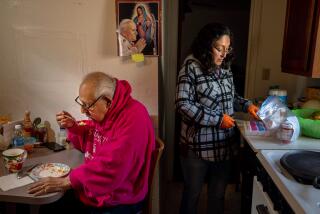Look for home-care workers willing to forge a personal bond
Finding good home health care for a parent is much like finding day care for a child: You first rely on word-of-mouth to collect names of possible caregivers and then go through a lot of trial and error until you get the right one.
Families often make mistakes in choosing a home health aide. I know our family did. When my 87-year-old mother, who is blind from glaucoma and weakened by osteoporosis, returned home from the hospital last winter, she needed someone to help her walk, bathe, dress and put drops in her eyes. My father, 92, is too frail to help.
My brother and I, in our haste to find a home health worker to help our parents, didn’t give enough thought to what kind of care was needed, and we didn’t make our needs clear to the home health agencies. We were not alone.
Families often don’t have much time to make good choices. Out-of-town children rush to their parents’ sides after a medical emergency and then must make quick decisions when it’s time to discharge mom and dad, and the hospital staff asks whether there’s someone at home to help.
Families often “take the first agency or woman they’ve heard about and go down a path that may not be the right fit, produce the right caregiver or offer the right service,” says Lucy Andrews, a nurse who heads a home-care agency in Santa Rosa, Calif.
Children who are in a hurry to get back to their routines don’t always draw up a list of tasks and activities for the caregiver. Sometimes they don’t consult the person who needs care.
My brother and I had thought full-time care was in order, but my parents believed they could get along with two or three hours of care each day.
Initially, we thought good care was getting someone in the house to put food on the table and make sure nobody fell. We didn’t realize that we also needed someone with good interpersonal skills who could reach out and help two people adjust to the loss of their independence. We had ignored their need for a personal relationship -- that bond between caregiver and patient so crucial to someone needing help with the most personal of daily activities.
The ideal caregiver, says Andrews, is a retired nurse, a grandmother who has lived in the community for 20 years; someone who is honest, fair, loving and caring. That’s the kind of person our family has now. She’s the best, my dad says, because she pays attention to them.
But we were fortunate; many people have difficulty finding the ideal caregiver Andrews describes.
Instead, families are more likely to get a stream of home aides who deliver inconsistent care, says Kathleen Kelly, executive director of the Family Caregiver Alliance in San Francisco. “Aides change constantly, and some are not well-trained.”
Asking about their training is essential. If you’re hiring someone to care for a relative who is confined to bed, make sure he or she knows how to properly turn the patient.
“We have an acute shortage of workers,” says Joseph Hafkenschiel, president of the California Assn. for Health Services at Home. “We’re at the low end of the food chain.”
The shortage doesn’t bode well for California, where the number of residents 50 and older is expected to increase 33% by 2020, much higher than the national average, according to a AARP study.
Home-care workers, who are paid $14 to $20 an hour, often can find less demanding employment with better benefits. So turnover in the industry is high. And even if a family is lucky to find the ideal worker, that worker might not stay. Some home aides are willing to work for low rates, and that makes them attractive to families facing high costs for care. If a family needs help 24 hours a day, the cost can easily approach that of a nursing home.
Plus there may be new financial pressure on families who use certified home health agencies that receive payments from Medicare and Medicaid programs. Congress is considering Medicare reform legislation that would require patients to make co-payments of $40 to $50 for each 60-day period.
Some members of Congress think the additional expense will discourage use of home-care services, something that’s unlikely as more families struggle to keep their loved ones out of nursing homes.
The federal government has begun to measure the quality of care delivered by home health agencies and plans to put some comparative information on its Web site at www.medicare.gov later this fall.
But even the best efforts of government to measure the quality of home health-care services will be unable to address the intangibles of this human endeavor. My mother, for example, needs someone to talk to and engage her in activities she enjoys, such as afternoon tea parties. That kind of care will always be in demand, and probably can never be measured.
*
Trudy Lieberman can be reached by e-mail at [email protected].


